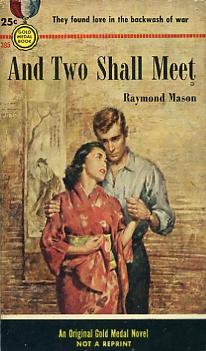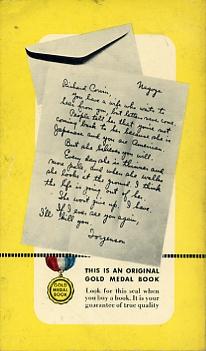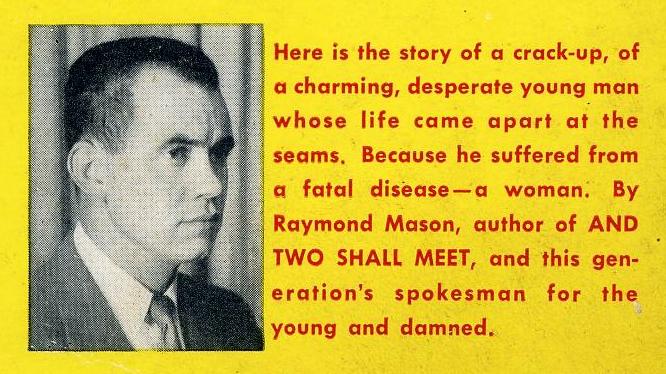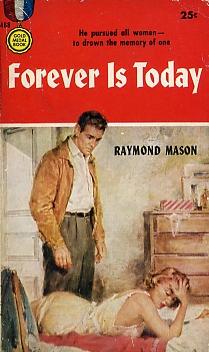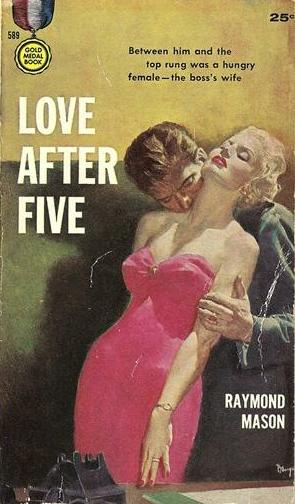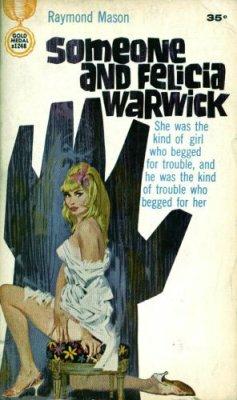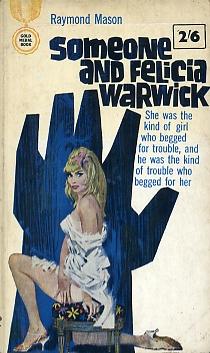And Two Shall Meet
Another proto-Sayonara romance
By William Wetherall
First posted 1 September 2006
Last updated 1 June 2010
Raymond Mason Maybe Nagoya would be differentThis novel, published only as "An Original Gold Medal Novel" -- meaning it was thought to be suitable only for paperback racks at drugstores and Greyhound stations -- starts as many time-killers do -- with a view of the world through the eyes of a protagonist who is looking for something to brighten his life (pages 7-8). A liberty ship is almost always dirty. It is either a little dirty or very dirty. The S.S. Edna K. Glutz was only a little dirty and it was a fine ship. There was a good crew aboard her. We lay at anchor in Nagoya harbor. The was was over and the Japanese home islands were ours and we had conquered them and some of us were still lonely in conquest. It was early November and the air was cold. I walked along the rail on the port side and tried to look out across the water. There was nothing but there might have been something. It was damp and dark and no one was interested in Japan except that there were women there and you could sleep with them if you had money, and everyone had money. We had been in Yokohama for a week before we had come to Nagoya and I didn't think it would be any different. It had rained all the time we were in Yokohama and it ahd been bombed out and all the big men of the Army were there. The streets had been full of holes and the people were hungry and there had been nothing to do. I hoped Nagoya would be different. Maybe the people wouldn't be so hungry and maybe there would be fewer holes in the street. He returns to his quarters and regards some letters on the desk in his room. One of them is from Maggie, who he hasn't seen since college in Missouri in the fall of 1941 when she told him she'd be going to a big dance with another guy. After Pearl Harbor, he packed his Model A for home in Kansas City and joined the Navy. The Navy released him because he had had a heart attack so he joined the Merchant Marine. Now he was in Japan, "twenty-nine and still alive, bad heart and all" (page 12). And in his heart were also thoughts of Carolyn, a high school friend he was still in touch with (page 15). He meets a wheeler-dealer civilian named George Torgerson, a husky man with a paunch and ruddy face who looked about forty. Torgerson introduces him to the beer halls and whore houses of the occupied city. At a beer hall for enlisted men are "taxi dancers" who sit and drink, and dance, but don't do "pom-pom". A girl in a party dress comes over. She doesn't sit down but just talks to Torgerson, who she seems to like, in Japanese. He seems to speak the langauge well "for an American who couldn't have been there very long." The girl leaves. "Nice girl," Torgerson says. "She's a pretty little thing," Dick, the protagonist agrees. Torgerson explains (page 17). She doesn't pom-pom. She's worked here ever since the place opened but she doesn't pom-pom. Got a couple of kids. Thinks her husband was killed in the islands somewhere. Most of the girls here don't go in for pom-pom. The dogfaces never learn that. The men had hit a whore house the night before but Dick was too drunk to remember if it had been good. While he is still fairly sober they hit another one, and this time he says the girl was good. Upon which Torgerson urges him to "quit the sea and get a Civil Service job" in Japan. Torgerson knows an opening his boss is holding open for a good man like Dick, who could speak Japanese. Dick just smiles and says he can't speak Japanese. He's going to back to Kansas City. During the two weeks it takes for Dick's ship to offload its cargo, he spends a lot of time ashore, some of it with Torgerson, who has gotten him a cot in his own dormitory, and some of it just walking around observing everything. He spots a girl sitting on a box painting a design on a vase with a brush (pages 22-24).
Well, all romances have to start -- and why not this way? Lillian tells Richard she has to help her mother, maybe she'll see him again, maybe not, goodbye, he has nice manners, better than soldiers. As Dick began walking he knew, he knows he will take the job with Torgerson and going home will have to wait. Dick takes the job, marries Iilly, finishes a novel, collects royalties, and returns for a while to the United States. His stay in the US drags on and letters he writes to Lilly never get mailed. One day Dick gets a letter from Torgerson (pages180-181). A briefer version of the letter is also featured in an image of a letter with an enveloope on the back cover.
Cover blurbs often misrepresent the stories they promote. Here the book-rack browser is led to think that the story is about an American man and a Japanese woman -- which is true but only in the most superficial way that many people are inclined to think about the human condition. Richard's letter more accurately reflects the true colors of the story as one about Richard's character as a man and Lilly's character as a woman. The first-person narration is on the whole well done. Raymond Mason lays the foundation for Richard Corvin's complex character as an ordinary guy with a heart that is as at once emotionally confused, romanitcally sensitive, and physically weak. Lilly, in contrast, is a pillar of pure love and unwavering faith. After their reunion, she encourages Richard to keep writing despite the rejection slips, and it is through her efforts as a translator that he gains a foothold in the serialized fiction magazine market in Japan. Many scenes in this male-adventure romance ring both credible and authentic. The first-person voice is that of a writer who has possibly been there, done some of the things he writes about, and witnessed the others. The narrative is lean and literary in ways that mark the writing of many authors whose aspirations inspired Avon's Original Gold Medal paperback series. It provides sufficient foundation for the physically tragic yet romantically happy ending, in which first Lilly dies, then Richard hastens his own death to be with her. The Wind Cannot ReadLilly hides her illness from Richard much like Hanako hides her illness from Quinn in Richard Mason's The Wind Cannot Read (1947), which is also related in first-person. Raymond Mason takes the tragedy an ironic step further by hiding Richard's disease from Lilly, though one suspects she knows. |
||||||||||||
Raymond MasonIt is not yet clear to me who Raymond Mason was or still may be. Judging from his publishers, settings, themes, and diction, he was almost certainly an American. Fawcett published a total of four titles by him in its Gold Medal Original series. 1954 And Two Shall Meet (395) Hillman published another title, set in California, in the gap between his last two Fawcett titles. 1960 Bedeviled (175) Forever Is TodayRaymond Mason Love After FiveRaymond Mason Someone and Felicia WarwickRaymond Mason Front cover blurbShe was the kind of girl who begged for trouble, Back cover blurb
She was a voluptuary in schoolgirl's clothing |
||||||||||||||||
